Hostels and Belongings: How to Keep Them Safe
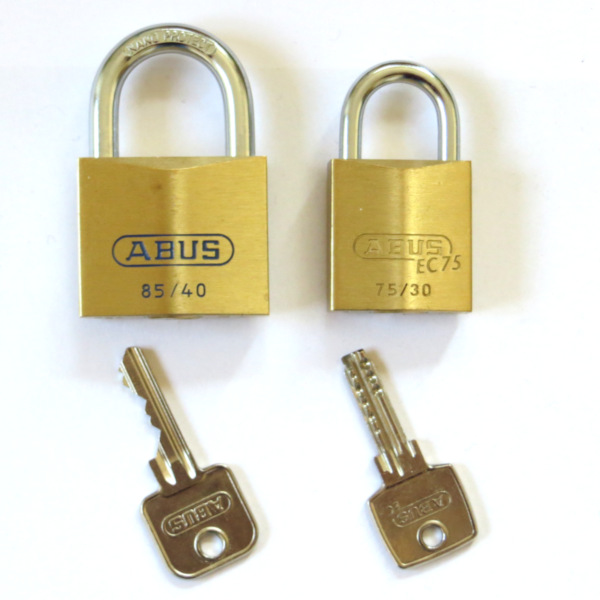
Ultimate guide to keeping stuff safe in hostels, so even paranoid people can feel safe: each situation in a hostel and how to deal with it.
Theft does not occur too often if you use some common sense and don’t let your valuables lying around. But if it happens, it can be infinitely annoying.
While the risk is usually not that high, it can still make you feel insecure. This guide discusses many tips, so that even paranoid people can feel safe while travelling and backpacking around the world.
The guide is structured as follows:
- Choosing a Hostel
- Packing Before You Start Your Travel
- While Being in Hostel (Anywhere Including Your Dorm)
- Leaving Your Dorm (e.g. Toilet, Leisure, Leaving Hostel etc.)
- Leaving the Hostel
- Sleeping
- Other
1. Choosing a Hostel
What to look for in a hostel:
- Be conscious of in what area you choose your hostel. This includes country, city, city district, and maybe even if it is in an alleyway or right next to a semi-busy street.
- Check out the reviews about the hostel on multiple websites. Bad reviews or no recent reviews can be a warning sign. Also compare it to other hostels in the area: do they get much more reviews?
- Chose a hostel with a locker. Look at the pictures on hostel websites to see how big the lockers are and how good of an impression they make. The lockers should be be large enough for your valuables and in some hostels they are even large enough for your whole backpack.
- Sometimes separate rooms are available that sometimes even have a safe. But the safe is probably very small and you will still need a locker for your larger items, especially if the door lock to your room is not that good or the room has windows on ground level.
- The hostel should have some sort of access control to the building, like a locked main door or gate. A 24h reception is unlikely for a hostel, so you will be given a key to the entrance. This helps to prevent people who are not guests from walking into the hallways, which is important to make it harder for local thieves. While it is usually not described in the text, it is mentioned here in case you stumble onto reviews that criticize it.
- Your dorm room should be lockable (usually not described in the text, but if you stumble onto reviews that criticize it). It is handy because:
a) during daytime when everyone is out, it helps to prevent other people from walking in
b) during nighttime, it makes noise if someone tries to get in without the key. Even if the locking mechanism is not good and can be circumvented by, for example, simply lifting the door, it still deters thieves, as people inside might wake up. - The price has an influence. If the hostel is significantly cheaper than other hostels in the area, then they will have to save money wherever they can. They will save on repair and have cheaper door locks, less employees that are present, etc.
2. Packing Before You Start Your Travel
- Lockers at hostels are usually not large enough for your whole backpack. To avoid flashing your valuables around: get a separate bag (see below).
- Get padlocks for use with lockers (see below).
- Get additional padlocks to lock your backpack (if your backpack supports it).
- Get something to attach your backpack to your bed or another structure (see below).
- Make your backpack look dirty and used in order not to draw attention to it:
a) black spray paint works and some brownish colors also help. Only spray a tiny little bit from a far distance.
b) large felt marker pens work, too
c) see the two example images below: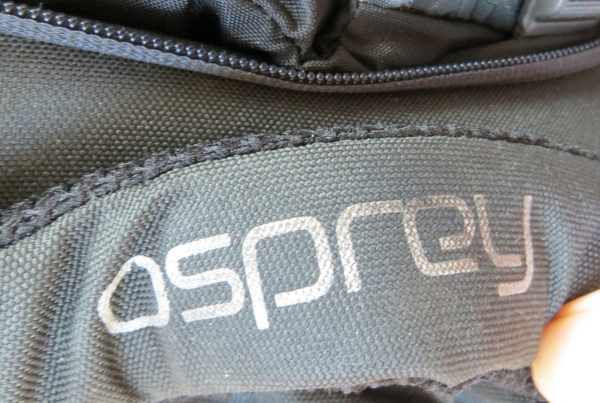
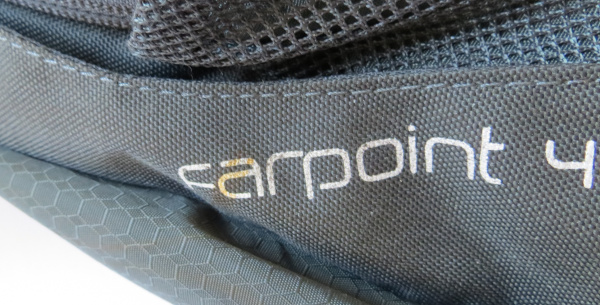
- Get underwear or something else that can hold your locker key while you are sleeping (see below).
3. While Being in Hostel (Anywhere Including Your Dorm)
Do not show valuables to others.
Do not wear shiny leather shoes or other stuff that communicates that your are affluent compared to other travelers or locals. Hide such items in your bag before you enter the hostel.
4. Leaving Your Dorm (e.g. Toilet, Leisure Inside the Hostel, Leaving Hostel etc.)
Basic Locker Instructions
Best Padlocks to Use
 Hostels do not provide locks for the lockers and if they do, then it is low quality.
Hostels do not provide locks for the lockers and if they do, then it is low quality.
Size
Some lockers only work with small padlocks, while others need somewhat larger padlocks. Get two good locks of different sizes (see image to the right):
a) Width of 30mm and shackle diameter of less than approx. 5.1mm (this smaller lock is more important to get)
b) Width of 40mm and shackle diameter can be 6mm or slightly larger
Padlock Type
Padlocks with keys are more secure than combination locks, but you must be able to handle the key and not lose it.
Most combination padlocks can be picked open in 10 - 30 seconds without any tools and more expensive combination locks often in less than 3 minutes. Key padlocks can also be picked open, but it requires tools. An opportunistic thief is less likely to have the tools at hand to open a key padlock.
Whichever type you get, do not get the cheapest ones, as they are very easy to open. Rather, choose the advanced line of whatever brand you are buying.
For more details read the article about the best padlocks for use in hostels.
Spread Items Inside the Locker
Use the locker when leaving the room. Spread the most valuable stuff separately in locker. Such that when a thief cracks open the locker, he might take out one bag and run away with it. I place credit cards and the passport outside my valuables bag in the back of the locker (where hopefully no one sees them).
Case 1: Locker is Large Enough for Valuables, But Too Small for the Whole Backpack
This is the most likely case.
Valuables Bag
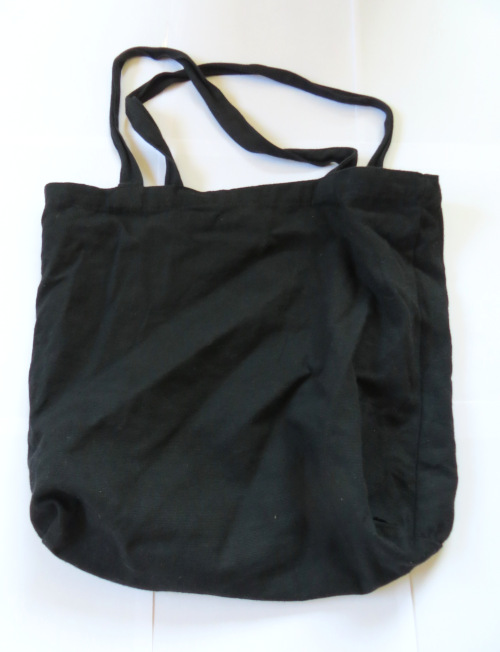 When the time has come to put your items into the locker, it is not advisable to open your backpack, go through each item, flash all valuables around, and put them into the locker one by one. It is advisable to have a separate valuables bag inside your backpack. You can then easily put this bag into the locker and all your important things are safe. You want to avoid flashing your valuables around as much as possible. This bag should be rather large such that not only passports and money fit into it, but all cameras, adapters, electronics, maybe even a notebook, and everything else you want to place in a locker.
When the time has come to put your items into the locker, it is not advisable to open your backpack, go through each item, flash all valuables around, and put them into the locker one by one. It is advisable to have a separate valuables bag inside your backpack. You can then easily put this bag into the locker and all your important things are safe. You want to avoid flashing your valuables around as much as possible. This bag should be rather large such that not only passports and money fit into it, but all cameras, adapters, electronics, maybe even a notebook, and everything else you want to place in a locker.
Leaving Backpack in the Dorm
If the locker is not large enough for the whole backpack, then you can either take your backpack with you or leave it in the room. If you leave it in the room, then there are two decisions to make:
Decision 1: Locking Your Backpack or Not (If Your Backpack Supports It)
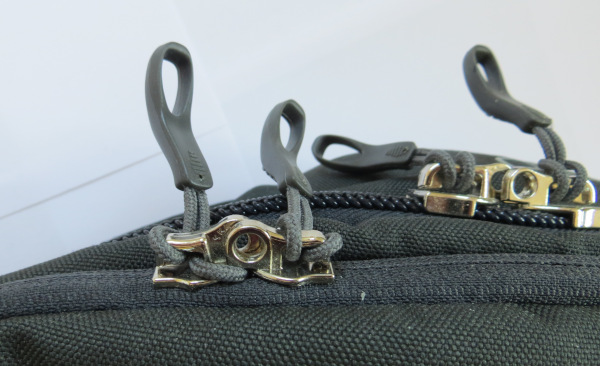 My choice is not to lock it, but to leave it open, so others can go through it and see that there is nothing valuable in it (valuable stuff is in locker). I sometimes even leave the zipper partly open. Else someone might steal the whole bag in a rush or cut it open. I do not care if one or two items go missing, I can go and buy a replacement, but the whole bag sucks.
My choice is not to lock it, but to leave it open, so others can go through it and see that there is nothing valuable in it (valuable stuff is in locker). I sometimes even leave the zipper partly open. Else someone might steal the whole bag in a rush or cut it open. I do not care if one or two items go missing, I can go and buy a replacement, but the whole bag sucks.
Decision 2: Attach Backpack to Bed or Not
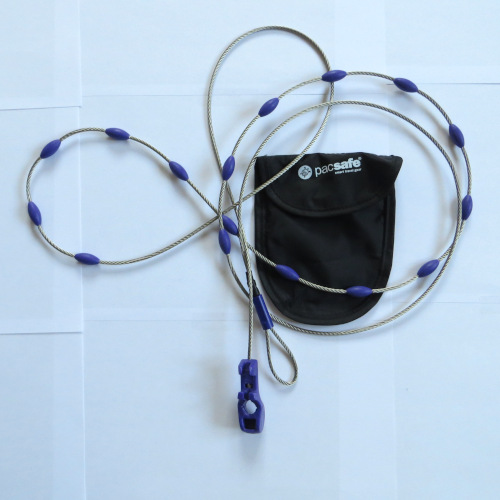 If you attach your backpack to the bed or some other structure, then it is harder for a thief to steal it. If the bag is not attached, then a thief might just take the whole bag with him. To attach it, a bicycle lock or a cable can be used (Pacsafe Wiresafe shown in the picture on the right). On the other hand, it also may advertise that there are valuables inside. If you attach your bag to the bed, then place it in such a way afterwards, that the cables are not visible.
If you attach your backpack to the bed or some other structure, then it is harder for a thief to steal it. If the bag is not attached, then a thief might just take the whole bag with him. To attach it, a bicycle lock or a cable can be used (Pacsafe Wiresafe shown in the picture on the right). On the other hand, it also may advertise that there are valuables inside. If you attach your bag to the bed, then place it in such a way afterwards, that the cables are not visible.
Decision 1 and 2 can be combined as follows: attach it onto the bed, but leave it open (maybe even partially unzipped), so no one tries to steal the whole bag.
Case 2: The Locker is Large Enough for the Whole Backpack
This is an easy one: put the whole backpack into the locker.
If the locker is large enough for your whole backpack, then it is advisable to have a separate bag for the stuff you need while being around the hostel. The backpack can then be in the locker the whole time while you are not in your dorm.
A tooth brush, sleeping clothes, and similar items can be placed in that bag. When you return to your dorm, you can get all the essentials without having to open your locker. It is especially handy at night. And it also reduces the amount of attention you get when using the locker.
If you feel unsafe about that additional bag, then place it in your locker. You get access to these items still much faster compared to searching them in your backpack.
It is anyway a good idea to have such a bag, even if you have your backpack next to your bed. It reduces the need for making light and noise should you return to your dorm at night. Others will appreciate it.
Case 3: No Locker
If there is really valuable stuff inside the backpack, then I would probably lock the backpack (if supported), put it under the bed, and attach it to the bed. This should help to deter opportunistic thieves, as it makes it more difficult for them. Place the backpack in such a way that the locks and the cable attaching it to the bed are not visible. Otherwise it will advertise that there are valuable items inside.
Or simply take all valuables with you, when you go out.
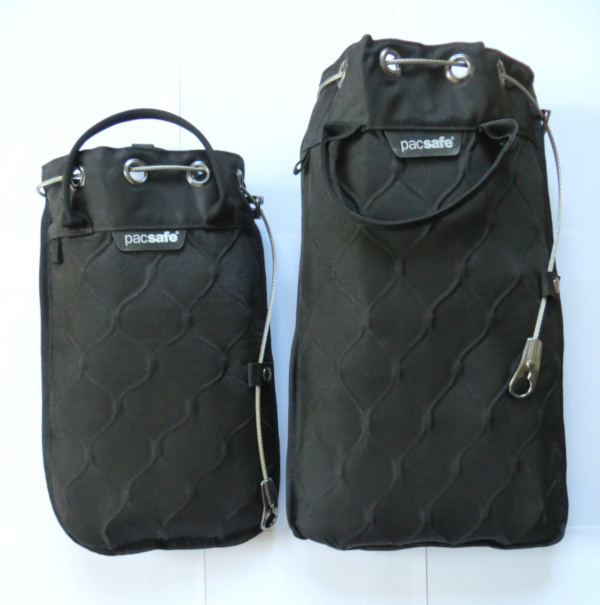 Pacsafe sells portable safes (Travelsafe). These can be locked and should be tied to the bed or other fixed structures. If you use a portable safe, then it is better to hide it in your backpack (while still attaching it to a fixed structure). There are different sizes available. To the right is a picture of a 3L and a 5L bag. The 3L is large enough for a wallet, passport, compact camera, and chargers together. The 5L can take a (very) small notebook. Larger sizes also exist.
Pacsafe sells portable safes (Travelsafe). These can be locked and should be tied to the bed or other fixed structures. If you use a portable safe, then it is better to hide it in your backpack (while still attaching it to a fixed structure). There are different sizes available. To the right is a picture of a 3L and a 5L bag. The 3L is large enough for a wallet, passport, compact camera, and chargers together. The 5L can take a (very) small notebook. Larger sizes also exist.
These mobile safes are also a good solution for when you sleep and you are worried about being stolen from. But just prepare them discretely, so no one sees them.
Pacsafe also sells a 85L bag protector, a wire mesh you can put around your whole backpack.
5. Leaving the Hostel
Theoretically, you can take everything with you.
But it is cumbersome, so I usually leave my large backpack at the hostel und use a daypack.
What I take with me depends on where I go.
If where I go is safe, I usually take the most important stuff with me during daytime (means wallet, most money, mobile phone, passport, credit card etc.). Not needed electronics are left behind in the hostel locker.
At night, it is discussable whether to take money and credit cards with you in case you get robbed (or get drunk). I usually do not take it with me.
6. Sleeping
Put everything you can into the locker, especially the valuables.
If valuables remain inside your backpack, then lock it and tie it to the bed.
You may also put the backpack on your bed if you are a small person and can sleep with only half the width of the mattress. This also makes it easier to get your clothes and stuff, especially if you are on a top bed.
Keep the key to your locker close to you while sleeping: somehow fixated in your underpants is probably the safest option, then a small money pouch worn on the belly, or in the pillow.
Also lock your phone in the locker. Do not place it next to your bed or at least put it into your pillow.
7. Other
Luggage Rooms
Baggage storage rooms are sometimes offered by the hostel. They are not that safe, because anyone can ask at the reception to go in.
Data Security
If you are worried about the security of your data, then place all important data on a small USB-Stick that you can always carry with you.
Got anything to add? Please comment below.
Published:
Last modification:
